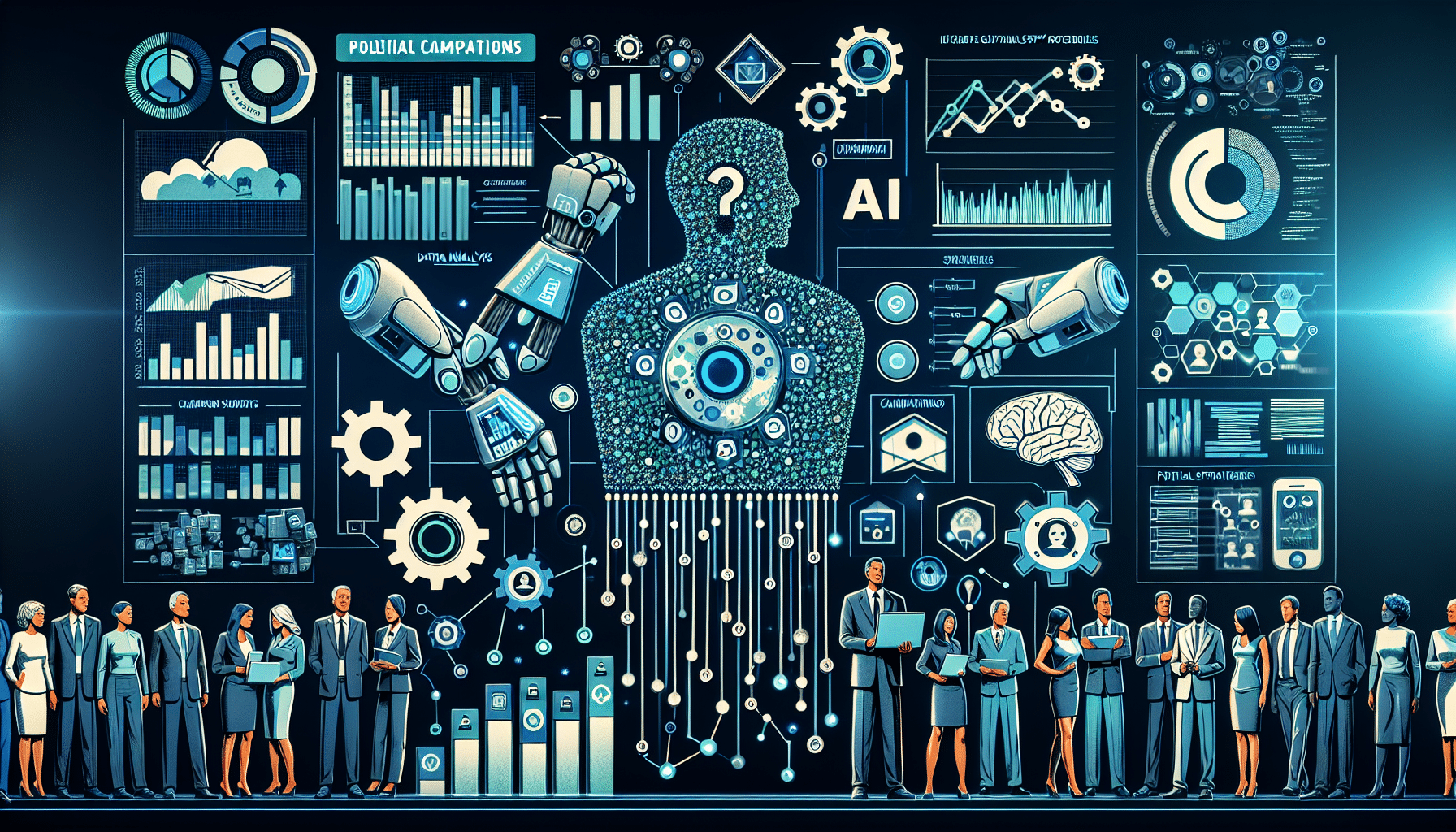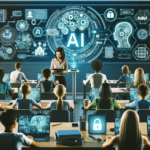AI automation in politics is more than just a buzzword; it’s a game-changer for campaign tactics. As someone who delves deep into this field, I see firsthand how AI tools transform campaign strategies. Imagine a tool that not only gathers voter data but also helps predict what voters really want. AI does that, sorting through heaps of info to pinpoint trending topics and voter concerns like inflation or public safety. This tech doesn’t just make campaigns smarter; it makes them more personal and direct. Explore with me how these changes impact political outreach, offering fresh strategies that leave no voter unheard. Dive into this fascinating world where AI automation reshapes how political parties connect and communicate.
How AI Automation is Changing Political Strategies
AI Tools in Campaigns
Analyzing Voter Data with AI
Artificial intelligence is transforming the way political campaigns understand voter preferences. By leveraging AI automation, political parties can sift through vast amounts of data to identify key trends and sentiments among various voter demographics. For example, AI can parse social media activity, voter registration data, and past electoral behaviors to isolate popular topics of discussion. This detailed analysis allows campaigns to tailor their messages more effectively, ensuring their platform resonates with a wider audience.
Improving Campaign Strategies
AI automation doesn’t just stop at data analysis; it drives smarter, more efficient campaign strategies. Predictive analytics can forecast voter behavior, helping campaign managers allocate resources more effectively. With tools like Constituency Manager, campaigns can use AI insights to focus outreach efforts where they’re most likely to secure votes. Moreover, AI can streamline communication, enabling more personalized and timely interactions with voters, thus enhancing engagement and support. These improvements make campaign operations not only faster but also more adaptive to changing political climates.
By integrating AI automation into campaigning, political parties can enhance their strategic agility, maintaining relevance in a swiftly shifting political landscape. This technology has the potential to redefine traditional campaigning methodologies, placing data-driven insights at the forefront of political strategy.
How AI Automation Impacts Jobs in Robotics
Robotics Job Market Growth
The growth of AI automation is significantly influencing the robotics job market, with a notable increase in demand for skilled professionals. As automation technologies become integral to operational efficiency, companies such as Dexterity and Exotec offer a wide array of job opportunities tailored to leveraging these advancements. These roles range from development to management, and they emphasize the application of AI in streamlining processes and improving productivity. Such companies are actively expanding their workforce, focusing on innovative solutions and client-driven results.
The rising complexities and capabilities of AI systems necessitate an upskilling of the current labor force to bridge the skills gap. Hence, there’s an increasing need for comprehensive training programs that equip individuals with the necessary skills in AI and robotics. Educational institutions and online platforms are offering specialized courses in machine learning, coding, and robotics, preparing the workforce for the technological demands of these industries.
Companies and Opportunities
Dexterity and Exotec are at the forefront of the robotics industry, presenting lucrative career opportunities. They seek professionals skilled in coding and problem-solving, crucial for addressing the challenges posed by rapid automation. As AI systems evolve, these companies need expertise in design, implementation, and maintenance, offering exciting prospects for both seasoned professionals and newcomers.
For job seekers, understanding the landscape and aligning skills with industry needs is vital. Engaging with emerging roles such as AI system designers requires a nuanced capability in artificial intelligence applications. Prospective employees are advised to focus on acquiring technical certifications and real-world experience, ensuring competitiveness in this fast-paced field. With a proactive approach to skill enhancement, individuals can tap into the expanding domain of AI automation in robotics, positioning themselves at the cutting edge of industry innovation.## Tools and Resources for AI Automation
Innovative AI Solutions
AI automation is revolutionizing how businesses and industries operate, offering unique solutions to longstanding challenges. Onix, a notable player in this realm, has developed Kingfisher and Phoenix, two tools that stand out for their impact on data management and decision-making. Kingfisher deals with the often tricky issues of data scarcity and privacy by creating synthetic datasets that accurately represent real data, thus allowing companies to innovate without breaching privacy. Meanwhile, Phoenix enhances business intelligence by streamlining the data analysis process, transforming raw data into actionable insights that can influence business strategies on the fly.
Tools for Automating Tasks
The demand for efficient AI tools continues to rise. These tools are designed to automate mundane tasks, thereby increasing operational efficiency across sectors. For instance, businesses can leverage AI-driven systems to automate customer service, using chatbots to handle basic inquiries while freeing up human resources for more complex tasks. This approach not only boosts productivity but also enhances customer experience by providing quicker response times.
How to Use AI in Business
Implementing AI in business operations can seem challenging, but beginning with small, manageable applications is a proven strategy. Consider a small business utilizing AI to streamline their order processing. This could involve using AI to predict inventory needs based on historical sales data, ensuring that stock levels are optimized, thereby reducing waste and catering efficiently to customer demand.
AI and Data Privacy
AI solutions often involve handling large amounts of data, which raises significant privacy concerns. Establishing clear policies and practices regarding data use is crucial for businesses to maintain trust and comply with legal standards. For instance, implementing robust data encryption techniques and obtaining explicit customer consent before using their data are prudent steps that enhance data security and privacy compliance. Emphasizing transparent data practices can reassure customers and partners while safeguarding sensitive information.
FAQs about AI Automation
What is AI automation and how does it aid political campaigns?
AI automation involves the use of technology to perform tasks with minimal human intervention, enhancing efficiency in various sectors, including political campaigns. In this context, AI automates data analysis to refine voter outreach strategies. By processing large volumes of data, AI determines the most resonant messages for target demographics, ensuring campaigns maintain direct and effective communication with voters.
How are jobs changing in sectors impacted by AI automation?
AI automation is transforming job landscapes, particularly in the robotics sector. As AI technology advances, new opportunities arise, demanding more sophisticated tech skills. Positions such as AI system designers and developers are seeing heightened demand, reflecting the sector’s shift toward more technology-driven roles that leverage AI to streamline operations and innovation.
How can job seekers prepare for roles in AI automation?
As the demand for AI-related positions grows, the acquisition of relevant skills becomes vital. Job seekers should focus on developing expertise in AI tools and technologies, perhaps through online courses or certifications. Understanding AI frameworks and gaining proficiency in coding and machine learning are significant steps to ensure readiness for emerging roles in this dynamic field.
What ethical issues arise with AI automation?
AI automation also poses ethical challenges, chiefly concerning privacy and data security. As AI systems process vast amounts of personal data, maintaining transparent data-use policies becomes crucial. It’s important for organizations to set clear privacy guidelines and ensure their AI systems comply with regulations to guard against data misuse.
Where can I find AI automation tools and resources?
A range of educational platforms and databases, such as “There’s An AI For That,” offers comprehensive listings of AI tools and resources. These platforms provide access to the latest AI technologies across industries, enabling users to explore and incorporate efficient solutions into their personal or business operations.
Conclusion
In today’s fast-evolving world, AI automation transforms political strategies and job markets. AI helps decode voter preferences, guiding campaigns to be more effective and relevant. Meanwhile, the growth in robotics and AI jobs offers exciting career paths. Companies like Dexterity and Exotec are hiring for tech-savvy roles. Embracing AI can streamline operations, offering solopreneurs a competitive edge. Stay ahead by exploring AI tools and training opportunities for an automated future. AI automation is key to unlocking new possibilities.


